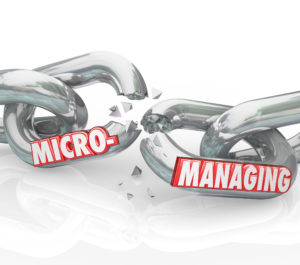Leadership and management go hand in hand. There are times to lead and there are also times to manage. We need to strike a balance between the two to hold people accountable including ourselves. They complement each other and are often used interchangeably but do mean different things.
Managers are focused on the bottom line and getting results within a short range of time. They want to ensure that policies, processes, procedures are followed. The manager wants to ensure that things are done correctly and stay within the norm. Leaders, on the other hand, want to create a long-term vision for their followers which allows for creativity and innovation. They share intent behind their actions to help people understand their goals as well as the goals of others. A leader focuses on developing the people they work with so they too can lead. The leader encourages the people to ask questions and be curious about information available to them.
Leaders cringe at the thought of being labeled as “a micro-manager”.
Do you know a micro-manager? Are you one?
What is the difference between micromanaging and holding someone accountable for their actions?
 Micromanagement and accountability are often misunderstood. Micromanagement is when the manager closely observes or takes control of the work of the people that report to them. They monitor and assess every step of the way. A micro-manager does not ask for input and may hide information to have the upper hand. These individuals do not trust that their people can do the job they were hired for.
Micromanagement and accountability are often misunderstood. Micromanagement is when the manager closely observes or takes control of the work of the people that report to them. They monitor and assess every step of the way. A micro-manager does not ask for input and may hide information to have the upper hand. These individuals do not trust that their people can do the job they were hired for.
Accountability is about the willingness to take responsibility for one’s actions. There is personal accountability as well as team accountability. When the manager shares information that involves facts and figures, they often need to look at how things happened and when. The leader will ask what happened and why. They will encourage their people to ask the tough questions and even challenge them to come up with solutions. When an individual or team takes responsibility for outcomes and results, they can reflect and look for the gaps from where they are to where they want to be. The manager often has to be accountable for the outcomes that their team delivers. A leader will inspire accountability by example.
There are situations in which micromanaging may help improve specific areas of a problem but should never be used as a long-term solution. Micromanaging is a strategy to improve performance and should not be used alone. We often have to take a step back and look at the big picture of what is going on in the system but we also need to take a closer look at the parts that make up the big picture. By doing so, individuals and teams can uncover where improvements can be made. This discovery can help us determine where accountability lies.
You can hold people accountable for their actions and results without micromanaging by asking powerful questions:
- What are the expectations? Clearly communicate and set expectations. Set the stage by explaining what is expected of an individual or team. Create a vision in their minds of what they should aim for.
- What is accountability when it comes to performance? Openly talk about accountability and performance so it’s not seen as micromanaging.
- How do they want to be held accountable? Ask the individuals or a team how they would like to be held accountable for their actions and agree on the process.
- What are the results and outcomes? Explain what the outcomes are if a person is not meeting expectations or performing well
- Where are the gaps? Share your observations of the gap between expectation and performance.
- What do they have to say about it? Ask for input.
- Who is best to come up with the solution? Give the individual or team ownership of the problem. Let them come up with a solution.
- What questions do they need answers to make informed decisions? Encourage them to ask questions and gather more information about what the facts and figures mean.
- What are actions with support the results and outcome we wish to achieve? Focus on results and outcomes and what actions can improve a problem versus focusing on the activities that cause the problem.
Let your people know what your intention is as you work with them. The people you manage and lead are your greatest resource and often will come up with the best solutions. Foster trust by demonstrating to the people you work with that they are capable of creating the results and outcomes shared in the vision. They are owners of the vision. Ask the questions that create accountability and allow the people to make the vision a reality under your leadership.
Leading and managing effectively can be an art. How do you hold people accountable?
DEBRA KASOWSKI, BScN CEC is an award-winning best-selling author, transformational speaker, blogger, and Certified Executive Coach. She has a heart of a teacher and is certified in Appreciative Inquiry and Emotional Intelligence. She is a contributing writer for Diversity Magazine and Fabulous at 50 Magazine. Debra Kasowski International helps executives, entrepreneurs, and organizations boost their productivity, performance, and profits. It all starts with people and passion. www.debrakasowski.com
 Small picture thinkers are reactive rather than responsive. They focus on the small things versus the impact on the bigger picture. They fail to see that all circumstances are temporary and anything that is temporary can change. They do not ask questions about how thinks can be different. Small picture thinkers focus on counting their losses versus the gains that they have. They focus on the negativity of a situation and get lost in the blur activities that take up their day and exhaust them.
Small picture thinkers are reactive rather than responsive. They focus on the small things versus the impact on the bigger picture. They fail to see that all circumstances are temporary and anything that is temporary can change. They do not ask questions about how thinks can be different. Small picture thinkers focus on counting their losses versus the gains that they have. They focus on the negativity of a situation and get lost in the blur activities that take up their day and exhaust them.
 This statement makes me think of the movie, “Groundhog Day” (1993) starring Bill Murray and Andie MacDowell where Bill Murray is continually taking the same actions and attending the same events, repeating each day over and over.
This statement makes me think of the movie, “Groundhog Day” (1993) starring Bill Murray and Andie MacDowell where Bill Murray is continually taking the same actions and attending the same events, repeating each day over and over. World-class executive coach Marshall Goldsmith states: “correcting the behavior, you will discover, does not require polished skills elaborate training, arduous practice or supernatural creativity. All that’s required is the faint imagination to stop what you been doing in the past-in effect-to do nothing at all.” What Goldsmith means “by doing nothing at all” is stopping behaviors like passing judgments, making excuses, hanging onto the past, negative thinking, adding our two cents to every discussion, and always having to win at all costs. How does it impact you or others? Sometimes the best thing you can do or say is nothing at all.
World-class executive coach Marshall Goldsmith states: “correcting the behavior, you will discover, does not require polished skills elaborate training, arduous practice or supernatural creativity. All that’s required is the faint imagination to stop what you been doing in the past-in effect-to do nothing at all.” What Goldsmith means “by doing nothing at all” is stopping behaviors like passing judgments, making excuses, hanging onto the past, negative thinking, adding our two cents to every discussion, and always having to win at all costs. How does it impact you or others? Sometimes the best thing you can do or say is nothing at all.